Quick Guide to Extension Impacts: Sustainability
A Note From the Sustainable Communities Extension Specialist
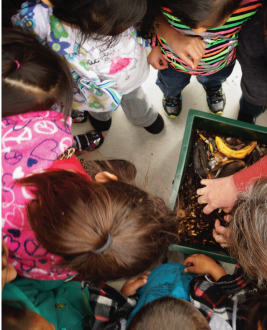
Utah has become one of the leading states in the nation for Extension sustain- ability outreach as a result of collaborative engagement by numerous stake- holders. The USU Extension Sustainability website has been visited by 94 countries and 96 cities and towns in Utah, with more than 20,000 page views since its launch in October 2012. The sustainability fact sheets have seen 1,923 downloads in just two years. The experimental social media campaign we launched to help inspire and educate the public about environmental sustainability has experienced involvement of several thousand people. As an exam- ple, the Facebook page has a following of more than 1,000, with posts regularly reaching over1,500 people. USU Extension Sustainability’s Twitter page has over 500 followers, Pinterest has more than 1,500 pins with 350 followers and the blog has achieved over 6,000 views. Utah’s sustainability programming and audience continues to grow, and I genuinely appreciate the partnerships, experience and insight contributed by numerous others in USU Extension who have helped make this possible.
– Roslynn Brain
Moab Bee Inspired Gardens
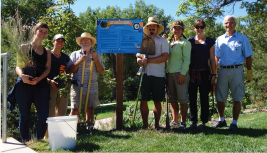 Community members pose by the first Moab Bee Inspired Gardens sign at Rotary Park in Moab, Utah. Moab Bee Inspired Gardens are a partnership with USU Extension Sustainability, Moab City, Bureau of Land Management and others. The community group was created to help residents implement pollinator friendly, water-wise, edible gardens. By planting an abundance of diverse flowering plants, the community can help address the global issue of pollinator decline.
Community members pose by the first Moab Bee Inspired Gardens sign at Rotary Park in Moab, Utah. Moab Bee Inspired Gardens are a partnership with USU Extension Sustainability, Moab City, Bureau of Land Management and others. The community group was created to help residents implement pollinator friendly, water-wise, edible gardens. By planting an abundance of diverse flowering plants, the community can help address the global issue of pollinator decline.
Currently four gardens have been planted in Moab, with two more planned for the spring of 2015.
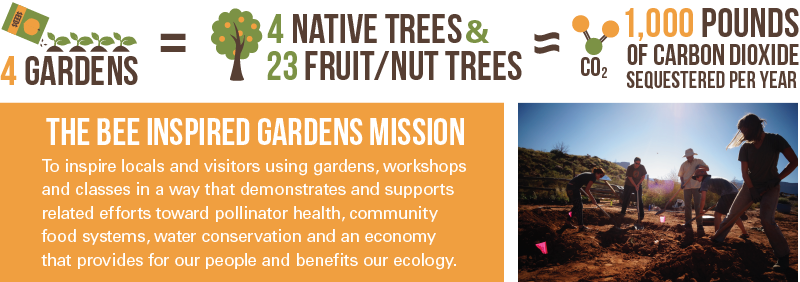
Sustainable You! Summer Camps
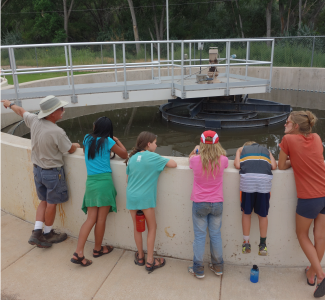 Sustainable You! summer camps were designed in collab- oration with Swaner Preserve and EcoCenter in Park City and Stokes Nature Center in Logan. The camps offer youth, ages 10 to 13, 5 days of environmental sustainability information and activities. Each day is themed around one of the major environmental sustainability topics of land, air, food, water and energy. The Sustainable You! camp curriculum has been published under peer review in Utah 4-H in collaboration with Dave Francis, USU Extension 4-H youth development specialist, and has been down- loaded from Alaska to Maine with an estimated reach of more than 2,500 youth annually.
Sustainable You! summer camps were designed in collab- oration with Swaner Preserve and EcoCenter in Park City and Stokes Nature Center in Logan. The camps offer youth, ages 10 to 13, 5 days of environmental sustainability information and activities. Each day is themed around one of the major environmental sustainability topics of land, air, food, water and energy. The Sustainable You! camp curriculum has been published under peer review in Utah 4-H in collaboration with Dave Francis, USU Extension 4-H youth development specialist, and has been down- loaded from Alaska to Maine with an estimated reach of more than 2,500 youth annually.
University of California Extension requested a “train-the-trainer” for Sustainable You! in the spring of 2014. Since this training, UC offers the camp in at least five California locations.
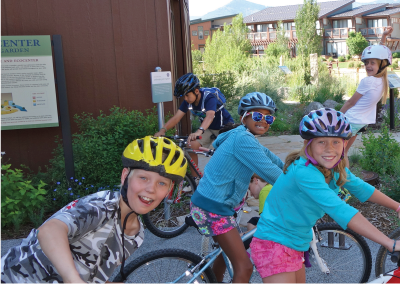
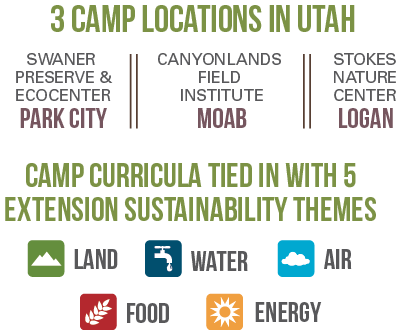
Glass Recycling
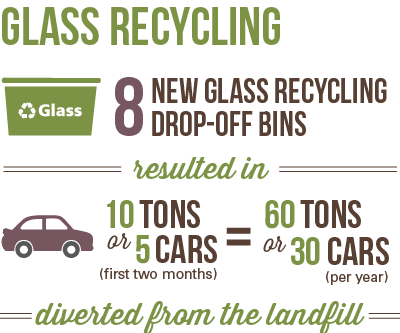 Through a partnership with Logan City’s Environ- mental Department, Momentum Recycling in Salt Lake City and USU Extension Sustainability, Cache Valley now offers glass recycling as of 2013. Call the Logan City Environmental Department at (435) 716-9755 for dropoff locations. For other areas, contact your local city or county environmental department.
Through a partnership with Logan City’s Environ- mental Department, Momentum Recycling in Salt Lake City and USU Extension Sustainability, Cache Valley now offers glass recycling as of 2013. Call the Logan City Environmental Department at (435) 716-9755 for dropoff locations. For other areas, contact your local city or county environmental department.
USU Extension Sustainability Provides Hands-On Learning
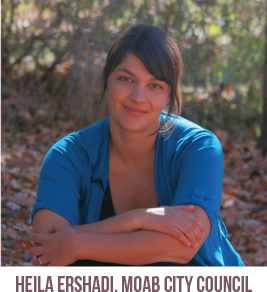 When Heila Ershadi ran for city council in Moab, she had the opportunity to talk with many people and found that sustainability is an important priority for those in the community. Because of the desert environment, water is something that is frequently on people’s minds.
When Heila Ershadi ran for city council in Moab, she had the opportunity to talk with many people and found that sustainability is an important priority for those in the community. Because of the desert environment, water is something that is frequently on people’s minds.
Moab and USU Extension have a shared interest in using permaculture techniques, and Ershadi said Extension Sustainability has brought together a number of different groups.
“The Bee Inspired Gardens address issues such as resistance to drought and local food security,” she said. “These gardens aren’t just demonstrations — they make a practical impact. Each garden helps feed bees and saves rain water from being washed away so we are pumping less out of the aquifers. And every little bit of food grown means that it doesn’t have to be trucked in from miles away.”
Ershadi said USU Extension Sustainability takes huge global issues and provides hands-on demonstrations on how those issues can be resolved while making the area more beautiful at the same time.
“Extension Sustainability is a very practical hands-on response to the issues we face,” she said.
Utah Farm-Chef-Fork
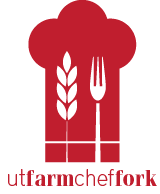 Utah Farm-Chef-Fork was created through a need determined by USU Extension county agents, Slow Food Utah and Utah’s Own to offer information to producers and chefs about direct marketing. Research has shown that when farmers use direct marketing with local restaurants, it is an effective way to increase farmer income and decrease farmland loss because it provides a greater proportion of the product’s final price to the farmer. In addition, local food sourcing has been linked to generations of economic development in local commu- nities. This in turn fosters public health outcomes related to food security and addresses food safety problems linked to the spread of disease via large-scale agriculture by using shorter supply chains. A USDA economic research report states that local food sourcing not only helps sustain small-scale farms but also supports more diverse products and a wider variety of seeds and crops as opposed to single-crop farming associated with large-scale agriculture.
Utah Farm-Chef-Fork was created through a need determined by USU Extension county agents, Slow Food Utah and Utah’s Own to offer information to producers and chefs about direct marketing. Research has shown that when farmers use direct marketing with local restaurants, it is an effective way to increase farmer income and decrease farmland loss because it provides a greater proportion of the product’s final price to the farmer. In addition, local food sourcing has been linked to generations of economic development in local commu- nities. This in turn fosters public health outcomes related to food security and addresses food safety problems linked to the spread of disease via large-scale agriculture by using shorter supply chains. A USDA economic research report states that local food sourcing not only helps sustain small-scale farms but also supports more diverse products and a wider variety of seeds and crops as opposed to single-crop farming associated with large-scale agriculture.
In the spring of 2013, trainings were launched for producers and chefs on direct marketing in three Utah counties. In the fall of 2013, six statewide chef-producer mingles were held to allow opportunities for producers and chefs to meet and discuss direct marketing options in a less formal environment. In 2014, three additional trainings were offered in collab- oration with Colorado State University Extension.

Create Paradise, Take Out a Parking Lot
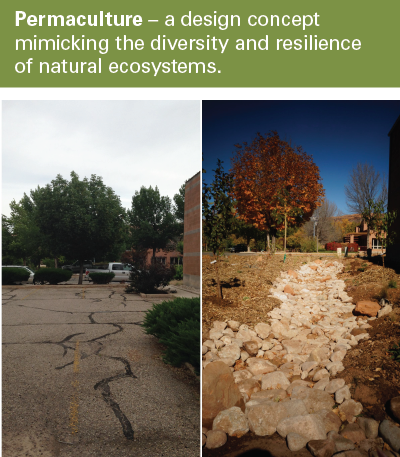 These photos were taken from the same angle on the USU Moab campus in the spring and fall of 2014. USU Extension Sustainability expanded and connected the garden space into the parking lot through the creation of a permaculture rain garden. The after photo shows a variety of fruit trees, currents, Indian rice grass and other perennial edibles. The garden is fed entirely by onsite water harvested from USU Moab’s roof, the neighboring building’s roof and eventually from rainwater tanks to be installed on campus. Now, USU Moab’s campus can serve as an educational space for Extension workshops on permaculture design, perennial food systems, pollinator health and water conservation.
These photos were taken from the same angle on the USU Moab campus in the spring and fall of 2014. USU Extension Sustainability expanded and connected the garden space into the parking lot through the creation of a permaculture rain garden. The after photo shows a variety of fruit trees, currents, Indian rice grass and other perennial edibles. The garden is fed entirely by onsite water harvested from USU Moab’s roof, the neighboring building’s roof and eventually from rainwater tanks to be installed on campus. Now, USU Moab’s campus can serve as an educational space for Extension workshops on permaculture design, perennial food systems, pollinator health and water conservation.
Utah Permaculture Initiative
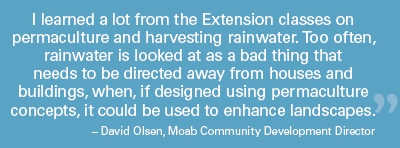 The USU Permaculture Initiative was developed to provide a demonstration space on campus for water-wise, pollinator-friendly, perennial edible gardens. It is developed as a partnership among Community Rebuilds (a nonprofit organization in Moab, Utah, providing energy efficient housing and sustainability education), USU Facilities, Nutrition Dietetics and Food Sciences (NDFS) and Landscape Architecture and Environmen- tal Planning (LAEP). Since launching this initiative, a permaculture garden is being planted on USU’s main campus, and USU Moab’s campus is now planted in permaculture design. NDFS students will use the garden harvest to learn about local and sustainable food production. To date, approximately 4,000 bricks from an old campus building have been diverted from going to the landfill and were used in the gardens.
The USU Permaculture Initiative was developed to provide a demonstration space on campus for water-wise, pollinator-friendly, perennial edible gardens. It is developed as a partnership among Community Rebuilds (a nonprofit organization in Moab, Utah, providing energy efficient housing and sustainability education), USU Facilities, Nutrition Dietetics and Food Sciences (NDFS) and Landscape Architecture and Environmen- tal Planning (LAEP). Since launching this initiative, a permaculture garden is being planted on USU’s main campus, and USU Moab’s campus is now planted in permaculture design. NDFS students will use the garden harvest to learn about local and sustainable food production. To date, approximately 4,000 bricks from an old campus building have been diverted from going to the landfill and were used in the gardens.



 Utah 4-H & Youth
Utah 4-H & Youth